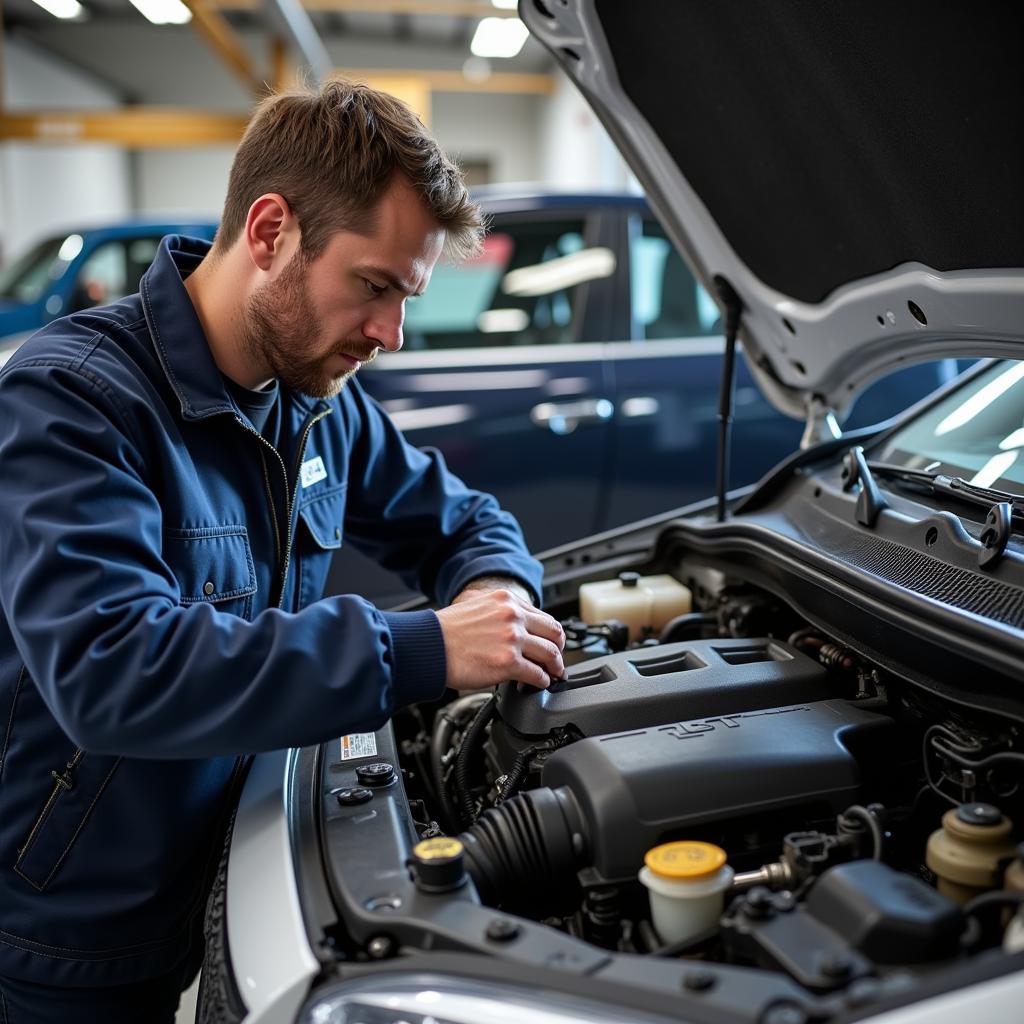How Many Miles Before Car Service? A Comprehensive Guide
Knowing when your car needs a service can feel like navigating a maze. Is it based on mileage? Time? Or that ominous little light blinking on your dashboard? While modern cars have made maintenance easier, the age-old question of “How Many Miles Before Car Service” persists. This guide delves into the factors affecting service intervals and empowers you to keep your vehicle running smoothly.
Debunking the “3,000-Mile Myth” and Other Misconceptions
For decades, the “3,000-mile oil change” mantra reigned supreme. This advice, however, is outdated. Advancements in engine technology and oil formulations have significantly extended service intervals. Today, most manufacturers recommend oil changes between 5,000 to 7,500 miles, with some even stretching to 10,000 miles or more for synthetic oils.
Similarly, the notion that you must visit a dealership for service to maintain your warranty is a misconception. The law protects your right to have your car serviced by any qualified mechanic, as long as they use original equipment manufacturer (OEM) or equivalent parts and follow the manufacturer’s recommended service schedule.
Factors Influencing Your Car’s Service Needs
While mileage plays a role, it’s not the sole factor dictating your car’s service schedule. Several variables come into play:
- Driving Conditions: Frequent short trips, extreme temperatures, dusty environments, and heavy loads can accelerate wear and tear, necessitating more frequent servicing.
- Driving Style: Aggressive acceleration and braking put additional stress on engine components and brakes, potentially shortening service intervals.
- Vehicle Age and Condition: Older vehicles and those with pre-existing issues may require more frequent checkups and preventative maintenance.
- Oil Type: Synthetic oils generally last longer than conventional oil, extending the time between oil changes.
Deciphering Your Car’s Service Schedule
The most reliable source for determining your car’s ideal service intervals is the owner’s manual. It outlines specific recommendations based on your vehicle’s make, model, and year. You’ll find a detailed maintenance schedule outlining the mileage or time intervals for various services, such as:
- Oil and Filter Changes: This essential service lubricates engine components, preventing excessive wear.
- Tire Rotations and Pressure Checks: Regular rotations promote even tire wear, while pressure checks ensure optimal handling and fuel efficiency.
- Brake Inspections: Brakes are critical for safety, and regular inspections can identify wear and tear before they become a hazard.
- Fluid Checks and Top-Ups: Your car relies on various fluids, including coolant, brake fluid, transmission fluid, and power steering fluid, to function properly.
- Filter Replacements: Air filters, cabin air filters, and fuel filters prevent contaminants from entering vital systems.
Recognizing the Warning Signs: When Your Car Needs a Check-Up
Even if you diligently follow your car’s service schedule, unexpected issues can arise. Be vigilant and watch out for these warning signs:
- Unusual Noises: Grinding, squealing, knocking, or hissing sounds can indicate problems with your brakes, belts, engine, or exhaust system.
- Fluid Leaks: Puddles of oil, coolant, or other fluids under your car are a sure sign of a leak that needs immediate attention.
- Warning Lights: Never ignore dashboard warning lights, especially the check engine light, as they often indicate potential problems.
- Changes in Performance: A decrease in fuel efficiency, sluggish acceleration, difficulty starting, or unusual vibrations could signify underlying issues.
“Regular car maintenance is not just about fixing what’s broken,” says John Miller, Senior Automotive Technician at ABC Auto. “It’s about preventing problems before they occur, ensuring your vehicle operates at peak performance, and extending its lifespan.”
The Benefits of Regular Car Service
Sticking to a regular car service schedule offers numerous advantages:
- Improved Safety: Regular maintenance ensures all safety-critical components, such as brakes, tires, and lights, function optimally.
- Enhanced Performance: A well-maintained car runs more efficiently, delivering better fuel economy and performance.
- Increased Lifespan: Preventative maintenance reduces wear and tear, extending the life of your vehicle.
- Higher Resale Value: A well-documented service history increases your car’s value when it’s time to sell or trade-in.
- Peace of Mind: Knowing your car is in top shape provides peace of mind and reduces the likelihood of unexpected breakdowns.
How Often Should You Have a Car Service?
While the general rule of thumb is to follow your car manufacturer’s recommended service intervals, consider more frequent servicing if you:
- Frequently Drive in Harsh Conditions: Extreme temperatures, dusty environments, and stop-and-go traffic put additional stress on your vehicle.
- Tow Heavy Loads or Use a Roof Rack: Hauling heavy items requires your engine and transmission to work harder, potentially leading to increased wear and tear.
- Notice Any Warning Signs: Don’t ignore warning lights, unusual noises, fluid leaks, or changes in performance – address them promptly.
 Mechanic Inspecting Car Engine
Mechanic Inspecting Car Engine
Conclusion
The answer to “how many miles before car service” is not a one-size-fits-all. While mileage is a factor, driving conditions, vehicle age, and individual driving styles also play significant roles. Consult your owner’s manual, be attentive to warning signs, and prioritize regular servicing to keep your car running smoothly and safely for years to come.
For expert car service and maintenance, find a trusted mechanic near you. Remember, a little preventative care goes a long way in ensuring your vehicle’s longevity and your peace of mind.
Need help finding the right car service for your needs? Where to go for car service? We’ve got you covered. Learn more about which car company has the best customer service to make an informed decision.

